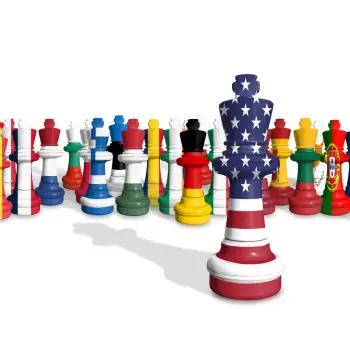A lot of ink has been spilled on the topic of the "Don't Ask, Don't Tell (DADT)" policy in the military and the 1993 law -- the Military Personnel Eligibility Act -- that prompted it. Full disclosure: I've spilled some of that ink myself (see here, here, and here). Readers will probably guess that, as an evangelical Christian conservative and retired Naval officer, I oppose lifting DADT. It allows gays to serve in the military now, without their sexual orientation being made the pretext for litigating other policies and issues.
What I anticipate, if DADT is lifted, is the threat of advocacy groups and lawyers recruiting plaintiffs (or prompting congressional investigations) for essentially political purposes. Based on that concern, the military's senior leaders will try to adopt defensive policy in preparation for the change in environment. I wrote at the links above about the ways in which that concern has played out in other organizations, from foreign militaries to police and fire departments and private companies in the U.S. We can expect those same issues to arise for the U.S. military.
Unless Congress sets explicit, preemptive policy in advance, three categories of issues will affect conservative Christians in the military directly. One involves the military's provision of family and recreational services. Given the unlikelihood that everyone will agree on what is appropriate for children to see -- or, indeed, on what it means for adults with differing perspectives to share common areas -- policy conflicts are bound to arise.
It will not be clear that it's "right" for Christians to actively oppose certain policies or behavior standards. Doing that is one thing when the issue at hand is, say, Gay Pride Day at the commercial ballpark or gay pride marchers in a St. Patrick's Day parade. Policy differences between citizens are free speech. But policy differences between service members and the military are insubordination. This is especially clear with the second category of issues Christians will find confronting them: workplace standards.
The typical department of the federal government, for example, now celebrates Gay Pride month, as it celebrates Women's History month and African-American History month and Hispanic Heritage month. If DADT is lifted, it will be Defense Department policy for the uniformed military to celebrate Gay Pride month as well. This means the Chairman of the Joint Chiefs, the service chiefs, the theater commanders, and their subordinate commanders will be expected to sponsor, attend, and speak at events praising and commemorating gay service members. These exertions will be premised not on the specific, superior military performance of individual service members, but on the principle that gays as a group merit special recognition because of their sexual orientation.
The relevance of this to the military's warfighting mission is certainly a good question, but of equal significance to Christians will be the moral decision points that will arise. Like the San Diego fire department, for example (see the first of my links above), the U.S. military can order its troops to march in a gay pride parade. Military veterans will confirm the following assertion as well: that implementing openly gay service will mean additional "tolerance" training for everyone in uniform, and the grading of service members on specific affirmations of tolerance. Can Christians meet such institutional expectations and keep a clear conscience?
Will the military assume everyone to be tolerant unless proven otherwise, or will it assume intolerance unless prescribed affirmations are made? In a quiescent political environment, I have no doubt that the military's leadership would live and let live, and leave much unspoken unless specific instances of discord or threats to discipline arose. But the military will be operating in a political environment prejudiced by grievance activism and advocacy litigation. Its posture will be defensive and preventive -- as it was earlier this year when the Pentagon brass rescinded a prayer-breakfast invitation to a pastor who was known to have spoken in the past against lifting DADT.
The anticipated political hassle from gay advocacy groups is what the military wanted to avoid in that case. Christians can be legitimately concerned that the same fear will operate with respect to the third category of issues arising from the lifting of DADT: radical political hostility to Christianity. Americans probably wouldn't have predicted, for example, that a Los Angeles police officer would be placed under suspicion by the gay officers' association or denied promotion because he read a passage of scripture at a funeral while he was off duty. But that did happen, and as outlined at the first link to my earlier posts above, Christians in various situations have been subjected to similar kinds of suspicion and administrative prejudice across the country.





